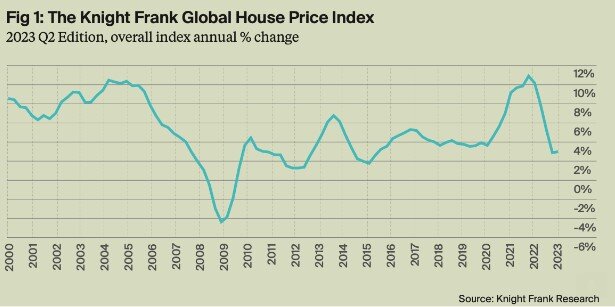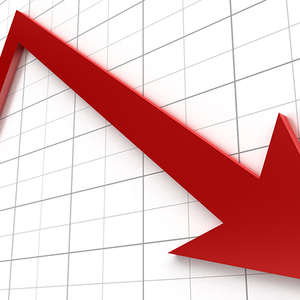Residential Real Estate News

Despite Peak Interest Rates, Global Housing Markets Improved in Q2
Residential News » London Edition | By Michael Gerrity | October 4, 2023 6:45 AM ET
According to Knight Frank's latest Global House Price Index, global house price growth ticked up to 3% in Q2 of 2023, up from 2.9% in the previous quarter. About a third of markets saw prices decline during the most recent three months, narrowing from four in ten over the past year.

Liam Bailey, global head of research at Knight Frank reports strong demographic trends in major markets, limited inventory of houses for sale, and significant delays to new build projects are all providing structural support for pricing - especially in markets like Australia, the US and Canada - which have seen price growth of 2.9%, 3.7% and 6.1% over the past quarter.
How far conditions improve will be limited by borrowing costs. Even if central bankers in key markets opt to refrain from raising interest rates further, the effects of past tightening will continue to work its way into the system. We expect pressure on market liquidity and transactional activity to continue well into 2024.
Leaders and laggards
Turkey leads Knight Frank's index for annual growth once again (up 96%), with nominal prices boosted by sharp underlying inflationary pressures. Lithuania follows (15.3%), with the south-eastern corner of Europe dominating the remainder of the top five spots in our ranking - with Croatia (14.0%), Greece (14.0%), and North Macedonia (12.9).
South Korea, Sweden, Finland, New Zealand, and Hong Kong are currently experiencing the largest rates of price falls - falling between 12.8% and 8.7% over the past 12 months. However, even at this end of Knight Frank's ranking, only Sweden saw prices fall in the most recent quarterly period.
The easing of downward pressure on house prices will be welcomed by many homeowners, but a full recovery is still a long way off. The 3.0% average rate of growth recorded this quarter is still the lowest rate since Q3 2015, when European markets were still recovering from the European Debt Crisis.
One of the consequences of higher interest rates has been a broad-based decline in investment activity across most economies, and housing investment, says Knight Frank. The impact of this lack of investment in new housing stock is being clearly revealed in rental markets, with global rents rising at three times their pre-pandemic rate according to our latest Prime Global Rental Index. Unless there is a significant structural shift in housing delivery, the same pressures will act to push house prices higher again as interest rates fall in 2024 and into 2025.

Sign Up Free | The WPJ Weekly Newsletter
Relevant real estate news.
Actionable market intelligence.
Right to your inbox every week.
Real Estate Listings Showcase
Related News Stories
Residential Real Estate Headlines
- Las Vegas Housing Market Tilts Toward Buyers as Prices Cool
- Ultra-Luxury Home Sales Surge Globally in Late 2025 as 555 Mega-Deals Close
- U.S. Luxury Home Prices Outpaced the Broader Market in 2025
- U.S. Homeowner Equity Growth Cooled in 2025 but Remained Historically Strong
- U.S. Homebuyers Scored Biggest Price Discounts Since 2012 as Market Shifts
- Ten Key Takeaways from the U.S. Housing Market in January
- Hong Kong Stock Market Front-Runs Local Home Prices by Two Months
- Mass Exodus: U.S. Homebuyers Cancel Deals at Record Levels
- U.S. Housing Outlook for 2026 Darkens After Sharp December Pullback in Contract Signings
- America's Housing 'Silver Tsunami' Is Turning Into a Trickle
- Builders Tell Congress Government Rules Are Pricing Americans Out of Housing
- California Housing Market Poised for Balanced Growth in 2026
- U.S. Housing Market Hits Largest Buyer-Seller Imbalance on Record
- Miami Housing Market Ends 2025 on Firmer Ground
- U.S. Homebuilder Confidence Dips at Start of 2026
- Remodeling Outlook Improves as U.S. Homeowners Tap Equity
- U.S. Home Sales Hit Three-Year High in December as Rates Ease
- Las Vegas Area Home Sales Hit 18-Year Low in 2025
- U.S. Mortgage Rates Hit Three-Year Low in January
- U.S. Home Affordability Closed Out 2025 Near Record Lows
- Ireland Home Prices Uptick 5.5 Percent in 2025 Amid Supply Shortages
- One Year After Los Angeles Wildfires, Investors Snap Up Burned Lots
- Greater Palm Beach Area Home Sales Surge in Late 2025
- U.S. Homebuilder Sentiment Ends 2025 in Negative Territory
- America's Single-Family Rent Boom Loses Steam in Late 2025
- Miami Home Price Gains Extend 14-Year Run in 2025
- Why Pre-Biden Mortgages Froze the U.S. Housing Market
- From Bricks to Blockchain: How Digital Dollars Could Soon Rewire Global Real Estate
- U.S. Home Sales Slightly Uptick in November
- Greater Orlando Area Home Sales Dive 22 Percent in November
- World Property Exchange Aims to Make Real Estate Ownership Instantly Tradeable and Democratized on a Planetary Scale
- Falling Home Prices Slash U.S. Homeowner Equity by $13,400 on Average in 2025
- Home Listings in U.S. See Sharpest Drop in Two Years Amid Cooling Buyer Demand
- Dutch Investors Pour Record $4.2 Billion in New Rental Housing in 2025
- U.S. Housing Markets Poised for 2026 Rebound, NAR Says
- Las Vegas Home Prices Hit Record High in November as Inventory Swells, Sales Cool
- Investors Accounted for 30 Percent of All U.S. Home Purchases in 2025
- Canadian Home Sales Recovery Continues in October
- Global Luxury Home Price Growth Cools to 2-Year Low in September
- U.S. Housing Market Recovery to Remain Fragile in 2026







